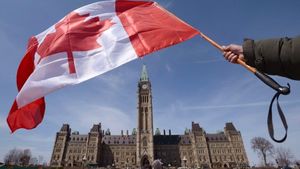The Gulf of Mexico has undergone a controversial name change on popular digital mapping platforms, now referred to as the Gulf of America for users within the United States. This decision stems from executive actions taken by President Donald Trump, who issued the order to rename the gulf on January 20, immediately upon returning to office. According to Trump, the move aims to restore names honoring what he advocates as American greatness.
Google Maps was among the first to implement the new designation, updating its application to reflect the Gulf of America as part of its commitment to align with official government changes. A representative from Google explained, “This is part of our longstanding practice of following name changes when updated by official government sources.” The renaming appeared particularly significant as it marked the application’s quick adaptation to government mandates.
Following Google's lead, Apple Inc. has also updated its Maps app to incorporate the Gulf of America name for U.S. users and plans to extend this renaming on global platforms shortly afterwards. Apple’s decision came closely on the heels of Google’s adjustments, leading many to view this as part of wider acceptance of the name change across major tech companies.
Interestingly, Microsoft’s Bing Maps and MapQuest Inc. have yet to reflect this name change, leaving their digital maps still referring to the more historically recognized Gulf of Mexico. Users of these platforms may find themselves puzzled by the discrepancy, as major tech players navigate the political ramifications of the change.
Significantly, the name change has not been welcomed by all parties. The Mexican government, under President Claudia Sheinbaum, has formally condemned the U.S. action, asserting, “The U.S. has no legal right to change the Gulf’s name.” She pointed out international treaties, particularly the United Nations Convention on the Law of the Sea, which restrict naming rights to waters extending only 12 nautical miles from any nation’s coastline.
The controversy quickly escalated as the Associated Press (AP), one of the largest media organizations globally, announced it would not alter its style guide to reflect the new name. AP’s Executive Editor Julie Pace criticized the Trump administration’s subsequent decision to bar an AP reporter from covering the signing of the executive order. She stated, “It is alarming… limiting our access to the Oval Office based on the content of AP’s speech not only severely impedes the public's access to independent news, it plainly violates the First Amendment.” This incident highlights the broader tensions between government policy and journalistic freedom.
To underline the importance of this renaming, President Trump declared February 9 Gulf of America Day, calling for public observance with various programs and ceremonies. This initiative aligns with his administration’s narrative of restoring American values and ideas, indicating the intent to solidify the rebranding as more than just a mere bureaucratic alteration.
Meanwhile, other name changes tied to Trump’s executive orders have emerged. For example, he has also mandated the restoration of the name Mount McKinley for Denali, which had been officially recognized as Denali for many years. While Google has yet to reflect this change on its maps, the AP remains committed to its established style guide, thereby continuing to refer to the mountain as Denali.
The fallout from these geographical renamings raises questions not just about digital mapping practices but also about identity, sovereignty, and international relationships. For many, the Gulf of Mexico remains symbolic of shared histories and cultural ties stretching across national borders. Arguments stemming from the renaming suggest it is not merely about geographical accuracy but rather tied to sentiments of nationalism and historical erasure.
Looking forward, as tech giants like Google and Apple implement these changes, the potential for clashes with international laws and sentiments is pertinent. Will other tech companies feel pressure to conform to these new naming conventions? And how might nations respond to these shifts? Observers say these developments could have ripple effects, influencing everything from educational curricula to international relations.
Despite the pushback from Mexico and leading media organizations, it's clear this name change is already becoming part of the digital narrative, marking another chapter within the tumultuous relationship between geography, politics, and identity. Whether this name will endure both on maps and in public consciousness remains to be seen as various stakeholders voice their opinions and navigate the tense waters involved.



